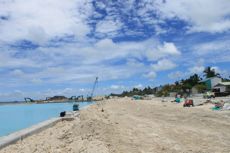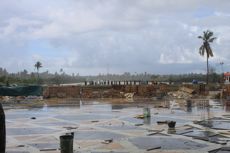Foreign dignitaries and heads of state from around the region have begun arriving in the Maldives for the 17th Summit of the South Asian Association For Regional Cooperation (SAARC).
The main Summit will run over November 10-11, however Minivan News understands that most of the talks between leaders will take place in the preceding days, together with the key decisions.
Leaders of all SAARC countries – including Bangladesh, Bhutan, India, Nepal, Pakistan, Sri Lanka and Afghanistan – have confirmed their attendance, according to the Maldives’ Foreign Ministry, while President Nasheed has already departed to oversee the remaining preparations.
In addition, ministers from Australia, Japan and China will join the Summit as observers. The Maldives’ former envoy for South Asia, Fathimath Dhiyana Saeed is serving as SAARC’s Secretary-General.
Media coverage of the event across the region has sharply increased with the departure of national leaders from their home countries.
One particularly anticipated event is the meeting between Pakistan’s Prime Minister Yousuf Raza Gilani and his Indian counterpart Dr Manmohan Singh, with Pakistan’s Business Recorder reporting that the meeting “on the sidelines” has been finalised for the 11th by the Foreign Office of Pakistan and India’s External Affairs Ministry.
According to the Recorder, the pair are due to discuss resuming dialogue between the two countries, as well as trade concessions. The two leaders also met earlier this year in Mohali on the eve of Pakistan-India cricket World Cup semi-final.
The Hindu reported India’s Foreign Secretary Ranjan Mathai as stating that topics of discussion between the two leaders would concern “the quick return of the military helicopter that had strayed into Pakistani territory, the in-principle decision by Pakistan to give most favoured nation (MFN) status to India and the visit of a Pakistani Judicial Commission to Mumbai.”
Prime Minister of Bangladesh, Sheikh Hasina, is meanwhile due to depart Dhaka on the 9th, arriving at 3:30pm on the Wednesday, reports the Bangladeshi media.
Sheikh Hasina is due to have a bilateral meeting with Indian Prime Minister Dr Manmohan Singh at Dr Ali’s Restaurant on the Shangri-La Villingili Resort, reports Bangladesh’s Daily Star newspaper, and will later attend a state banquet on Hulhumeedhoo.
Bangladeshi officials outlined key topics at the Summit as revolving around poverty alleviation, economic cooperation, the SAARC Development Fund, food security, connectivity, energy and climate change, with four regional agreements: Rapid Response to Natural Disasters, Seed Bank, Multilateral Recognition of Conformity Assessment and Implementation of Regional Standards as likely to be signed during the event.
Security at the event will be tight, with all traffic in the atoll restricted to military-run vessels. Joint Inter Agency Taskforce Commander Hassan Ziyad has observed that many of the leaders attending are “considered high risk even in their own countries,” and that respective domestic security threats are being taken into account by SAARC security forces.
All attending countries are providing security measures. Indian surveillance aircraft and navy vessels are patrolling the areas around Addu City and Fuvahmulah, while Sri Lanka has deployed six teams of sniffer dogs.
In India, the Hindu has meanwhile reported that a parallel “People’s SAARC” would be held in Thiruvananthapuram, in which political leaders would share the podium with “historians, writers, human rights activists and representatives of people’s movements”, during a two-day meeting of social action groups beginning on November 8.
“It will also focus on trade and livelihood issues, women’s role in people’s movements, de-militarisation and de-nuclearisation, natural resources and people’s movements and rebuilding the labour movement in the region. Other major concerns and topics to be discussed include exclusion, discrimination, oppression and tolerance, syncretism and secularism,” the Hindu reported.
Organisers of the parallel summit were reported as stating that “SAARC has comprehensively failed to take up issues confronted by the people of this region, which is home to the largest number of the world’s working poor.”
The Maldivian government has touted the SAARC as revitalising the southern atoll, highlighting its potential for development and putting it forward as a flagship for its ambitions to decentralise the country and take the pressure off Male’ – the most densely populated 2.2 square kilometres in the world.
Addu was granted the status of city in the lead up to the local council elections earlier this year, a move which met with heated disagreement from political opposition groups. The new city voted overwhelmingly for the ruling Maldivian Democratic Party (MDP), with the party winning all council seats in both Male’ and Addu.
The MDP claimed victory after winning the major population centres, while opposition claimed victory in overall numbers of councillors elected, with strong support across many of the country’s less populated islands.
Addu’s new council meanwhile plans to use the Rf 115 million (US$7.4 million) convention centre, a two-storey building of glass, wood and marble with a capacity of 3000 today unveiled as the ‘Equatorial Convention Centre’ with the main convention hall dudded ‘Bodu Kiba’, to transform the atoll from a quiet place to a hub of business and tourism.
“We have some representatives talking to businesses in Singapore and Malaysia about hosting events here,” Sodiq told Minivan News.
“We will be soliciting bids to find the right event manager to look after the convention center as well. I think there are people interested in what Addu has to offer, and I’m sure we can get a market for it.”
This evening almost 1000 students are expected to turn out to march on the streets of Addu to mark the Eid al-Adha holidays, while bashi’, futsal and beach volley tournaments are due to take place, reports Haveeru.
Entertainment, music and cultural activities will take place through the week.
Minivan News reporters will be stationed in Addu reporting on the SAARC Summit November 7-12. 150 foreign reporters from around the region are expected to attend the event.


